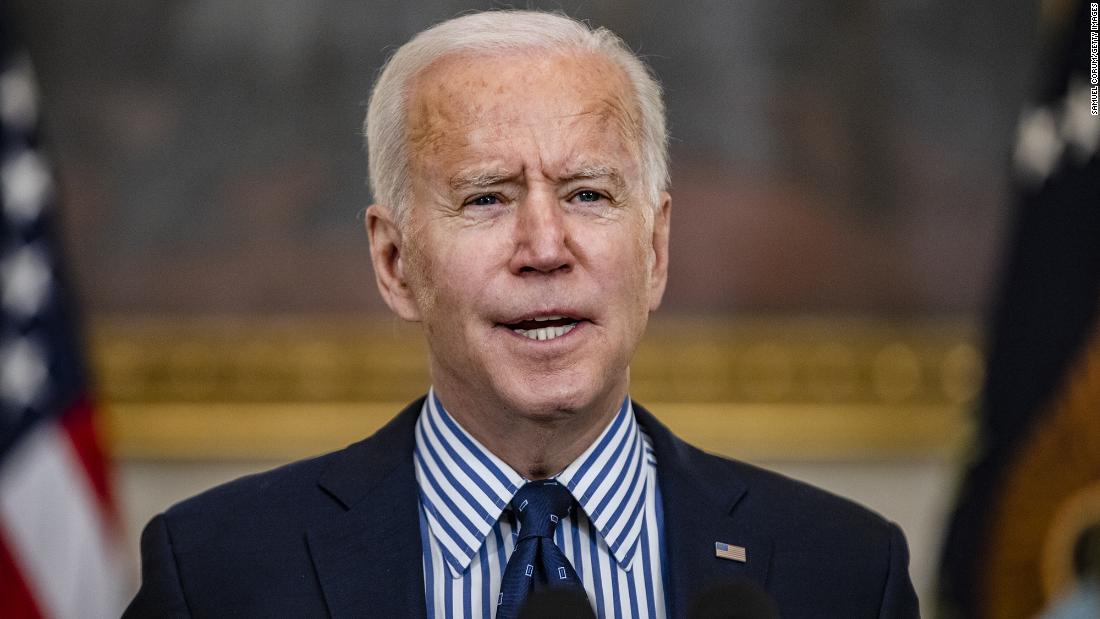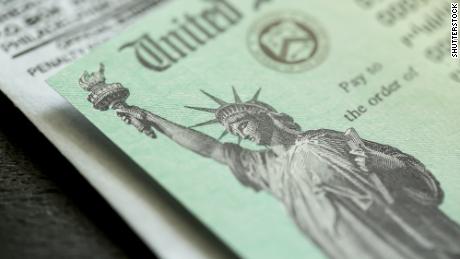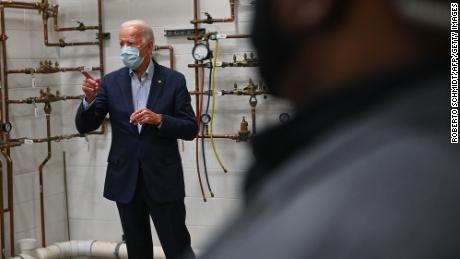Biden plans to use the $1.9 trillion Covid-19 relief bill expected to pass Congress Wednesday as a platform for a generational transformation of the economy
The passage of a bill of this scale and ambition two months into any new president’s term would represent a power-affirming win. The political payoff for Biden of his first legacy achievement may be even greater. He had to navigate the measure through thin congressional majorities and a Democratic caucus riven by ideological divides — and amid the worst domestic crisis since World War II.
“Leadership matters. Vaccinations are up, infections are down, $1,400 survival checks are on the way, and that is only the beginning,” Rep. Hakeem Jeffries of New York, the chairman of the House Democratic caucus, said on Tuesday.
Early successes are crucial for presidents, since they must harness their power when it is at its apex early in their terms. Political muscle is built for later legislative fights by enacting priorities and uniting party factions behind a common cause. Presidents who struggle to get early priorities passed are not necessarily doomed. But they risk creating an impression of disarray that can hurt them in their first midterm elections, as was the case with President Bill Clinton’s collapsed effort to overhaul American health care.
Presidential intervention
But Biden was unable to keep another of his campaign vows: securing Republican support for major initiatives. The President judged the $600 billion cost of an alternative package offered by 10 GOP senators as insufficient for the scale of the crisis. In votes so far in the House and the Senate, the bill has not attracted a single Republican supporter as Biden’s opponents stake out early positions for the midterm elections on the basis of a pro-Trump base of activists who are keen to deny the new President an early victory.
The rescue bill is unusually popular for such a huge and politically consequential measure. Various polls show that more than 60% of the public supports it, which means some Republican and independent voters are on board.
Yet if a bill this expensive is not a success, Biden will be exposed, given the lack of Republican support. Key GOP lawmakers are branding his No. 1 priority as a massive, untargeted liberal giveaway. Some economists, meanwhile, fear that it could trigger an inflationary spike in an economy that already appears to be in recovery and could overheat if there is a swift exit from the pandemic.
Republican House conference Chair Liz Cheney on Tuesday warned that there would be an inevitable consequence from the scale of the bill — even though the GOP was quite happy to throw around money when Trump was president.
“It’s a real tragedy when you look at that package. We know that the result of that package is going to be middle-class tax increases,” the Wyoming Republican said.
An expansive federal government
Some pundits have already described the bill as the most fundamental boost to the welfare state since President Lyndon Johnson’s Great Society measures. While Biden’s ambitions appear in the same ballpark as those of LBJ and New Dealer President Franklin Roosevelt, the Rescue Act may not deserve such comparisons.
Many of its key provisions — including health insurance subsidies, an extra child tax credit and food stamps — expire in months or at the most two years. But progressive activists see the bill as a down payment on federal benefits that politicians will find politically hard to remove, at least under Democratic majorities. The bill is sure to be a fulcrum of the Democratic midterm election campaign next year.
After his address on Thursday, Biden is eventually expected to hold his first presidential news conference, speak to a joint session of Congress and hop aboard Air Force One in the kind of countrywide blitz that has been put on hold so far because of the pandemic.
Biden has said that President Barack Obama was too modest in touting the success of the $800 billion Recovery Act in 2009 — and he seems keen to avoid the same mistake.
In that case, however, the recovery was always going to be sluggish after the Great Recession. By the time of the midterm elections in 2010, many Americans were still hurting and it would have seemed crass to mount a victory lap.
But if the current pace of vaccinations is maintained and the end game of the pandemic is not derailed by a wave of sickness and death caused by Covid-19 variants, Biden can expect a much faster and more robust economic rebound.
Ideological divide
The comparison shows the massive ideological divide between the two parties, even as some pro-Trump Republicans seize on culture war issues to portray their party as the true voice of America’s working class.
GOP lawmakers, however, also have little incentive to break with the party line despite the popularity of Biden’s bill, since in an era of gerrymandered seats and hardened partisan divides the greatest threat to their jobs comes from primary challenges.
While the White House is gearing up to spin what it regards as a massive success, the process of passing the American Rescue Plan also included warning signs for Biden as he eyes the rest of his ambitious agenda, which includes immigration revisions, climate change legislation, infrastructure spending and gun control.
His initial $1.9 trillion request, not far off half the entire US annual federal budget, is playing into Republican claims that his administration will be rooted in out-of-control socialism. The attack takes substantial liberties with the term but did appear to resonate in sectors of the electorate in last November’s elections, when Republicans in the House narrowed the Democratic majority.
The painstaking task of getting moderate Democratic senators like Manchin and Arizona’s Kyrsten Sinema in line with their colleagues suggests there could be difficult discussions ahead if Democrats seek to hobble the fossil fuel industry. And eight Democratic senators voted against a bid by Sanders to insert the minimum wage rise into the Senate bill. The Vermont independent’s gambit was in many ways a symbolic one but it did underscore one of the fault lines in the Democratic Party on Capitol Hill.
The partisan nature of the votes on Biden’s recovery package also has some Democrats pondering whether to seek to abolish filibuster rules that mean most major legislation needs a 60-vote majority to pass. The $1.9 trillion behemoth was advanced using a process known as reconciliation, which applies only to budget issues and can be used only sparingly.
The White House says Biden, a Senate traditionalist, hopes to avoid such a move — which would probably be a step too far for Manchin and Sinema. But it seems equally certain that Democratic priorities like voting rights will die in a 50-50 Senate.
![]()








